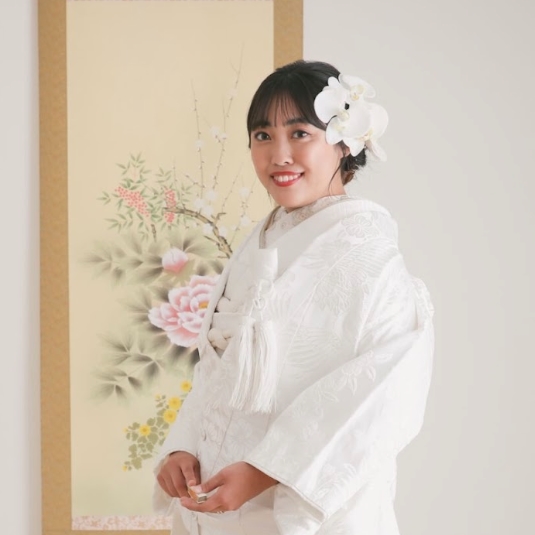Contents
Hello! Who are you?
Hi, I’m Miku, a 24-year-old Japanese woman. Since I got married to a Sicilian, I currently live in Sicily with my husband and a cat we rescued from the street.
I work as a co-worker at a company in Tokyo, and I am pursuing a career design course for high school and university students to inspire young people to live their own lives.
I consider myself a very happy person because I have many people whom I hold dear, including my family, family-in-laws, friends, and students, and I am extremely passionate about my job.

💡 By the way: Do you find it hard to be happy and in control of your life? It may not be your fault. To help you feel better, we’ve condensed the information of 100’s of articles into a 10-step mental health cheat sheet to help you be more in control. 👇
What is your struggle and when did it start?
I struggled with the loss of important people. After moving to Sicily, all the members of my husband’s family treated me as a real family member, and I began to feel at home with them. Eventually, all of them became very important to me.
My grandfather remarried three years ago, and both he and his wife welcomed me to their wedding party. They shared a deep love, and I used to think I wanted a relationship like theirs in the future.
One day, my mother-in-law informed me that my grandfather was very sick and going to the hospital. Three days later I talked to the grandmother about what we would do after he left the hospital, he passed away and didn’t come back.
I couldn’t bear to see my grandmother’s tearful face, and it was only when I saw him lifeless that the reality hit me.
Two months later, my other grandmother-in-law became seriously ill, and my mother-in-law told me that she was close to death. Since we lived close to her, I used to visit her home to chat, much like I would with my real grandmother.
One week later when I received the news, my mother-in-law said, ‘Now is the last chance to say goodbye.’ I saw her in a very sick and weakened state, and I realized I needed to say my farewell. Witnessing my mother-in-law and her sisters crying was an experience I had never had before.
Three days after we held the funeral for my grandmother-in-law, I received an unexpected phone call from my mother. I couldn’t believe the words she spoke, which were, ‘Your grandmother passed away yesterday.’ It was especially hard to accept because I was far away from Japan.
However, after I saw her lifeless face during the funeral through a video call, I finally came to terms with her loss. She had suddenly suffered a heart attack and died at the hospital. The last time we met was a year ago before I moved to Sicily.
We had plans to return to Japan, and she was eagerly looking forward to our reunion. It was the first time I had ever seen my grandfather cry, and it was a heart-wrenching moment.
Before the funeral, I asked my mother for some assistance with my husband’s small issue. Unexpectedly, after I sent her the message, she revealed a secret which she was trying to keep hidden until her death. She told me, “Five months ago, I was rushed to the hospital by ambulance and spent several days in the ICU(intensive care unit).”
The doctors had discovered that she had a heart problem, which turned out to be the same disease as my grandmother’s. When I heard this revelation, it marked the beginning of my most challenging and emotionally turbulent period.
How did this struggle make you feel at your worst moments?
I lost three family members in a short period of time and I felt like I was going to lose everyone (my father and grandfather also have serious illnesses) before I could go back to Japan to visit them. I couldn’t stop crying when I thought about what I had lost, so I just kept busy, working, and going out with my husband and his family.
However, I saw people die so frequently in such a short period of time that every night when I closed my eyes, I could easily imagine my mother, father, and grandfather‘s dead face. It kept me awake for four days and my husband woke up every time I cried, even though it was 4 am. These were very difficult days for me.
They were short and occasional, but I was able to think positively. That is because I am usually a very positive person. At those times I would think things like, “If I could get through this hardship, you will be stronger” or “Let’s not focus on what we have lost, let’s focus on what we have.”
I showed my husband all my emotions and told my colleagues a lot about my struggles. My husband accepted all my emotions and this helped me to recover from my predicament.
👉 Share your story: Help thousands of people around the world by sharing your own story. We would love to publish your interview and have a positive impact on the world together. Learn more here.
Was there a moment when you started to turn things around?
About four days after I heard that my mother had been taken to the ICU, things started to turn around. I cried for a long time, but my husband said, “What does your grandmother want you to do? Do what your grandmother wants you to do.”
Thanks to these words, I soon realized that the only thing my grandmother wanted from me was to be happy. Once I realized this, the cloud over my mind disappeared, the sunshine began to shine through and I began to think positively as before. From this experience, I learned that if I am unhappy, none of the people I care about will be happy.
If I consider asking people for help and sharing my feelings with others as “my actions“, then almost 100% of the improvement is due to my actions. I have decided to reject some of the negativity.
Also, since I started to think about “appreciating what I have“, I have increased my communication with my family. I call my mother on the phone daily, actively message my family, and send photos and dairy products to my grandfather.
What steps did you take to overcome your struggle?
When you lose a loved one and feel the worst, there are three steps to help you get over it. They are: not forcing yourself to do anything, revealing your feelings and worries to someone you can disclose them to, and focusing on what you have.
When I look back on why I was able to overcome this so quickly, I realize that these steps helped me a lot.
First, don’t push yourself too hard. This may be hard to understand, so let me give you an example. When you lose someone you love, your heart breaks so much. At such times, the best thing you can do is to be honest with yourself.
If you want to cry, you can cry. If you want to play, you can play.” There is nothing that “has to be this way”. I encourage you to listen to your heart and do what your heart says: “What do I want to do? I cried until I felt better.
Second, you need to disclose your feelings to someone you can open up to. It is very difficult to keep emotions hidden. I am a very ‘open’ person and if I have a problem, I immediately talk to someone about it. This is because every time I confide in someone about my problems, they quickly disappear.
Also, this time, when I confided all my feelings to my husband, he gave me words that triggered a mental change. Not only my husband but also my family-in-law and colleagues have supported me. If you need help, don’t hesitate to ask for it.
Third, focus on what you have, not what you have lost. It can be difficult to think this way when you are depressed, as you see a tunnel, but when you are ready to get back on your feet, consciously think about what you have.
When I experienced loss, I reflected on what I had. And that I have a husband who accepts me for all I am, a family who always cares, colleagues who let me think about my family without worrying about work, a job I love, and smiles on the faces of my students! When I look at what I have, I realize that I have so much.
Have you shared any of this with people around you in real life?
As I mentioned before, I am a very “open” person, so I can tell everyone, but of course very close people, like my husband, family, colleagues, and friends. I would also like to share with anyone who has experienced similar struggles.
After I overcame it, I am sharing this story with people who need it. I have already told about 10 people. I understand that sharing mental health problems is very difficult for some people, but having mental health problems is normal and you overcome them anyway.
If you could give a single piece of advice to someone else that struggles, what would that be?
You never know when you might lose someone you care about. When we have time together, let’s think about whether we will regret it or not. I started to think this way when I became very reluctant to speak to my grandfather, who had already passed away, on the phone and tried to hang up as soon as possible.
It was only a few days later that I realized that that phone call was the last communication I could make with my grandfather before he passed away. Since then, I have learned to cherish the time I have with my family and always try to be with them so that I don’t regret it.
What have been the most influential books, podcasts, YouTube channels, or other resources for you?
- Happier: Learn the Secrets to Daily Joy and Lasting Fulfillment by Tal Ben-Shahar: It helped me to know what happiness is.
Where can we go to learn more about you?
You can find me on Instagram, and check out my career school.
💡 By the way: If you want to start feeling better and more productive, I’ve condensed the information of 100’s of our articles into a 10-step mental health cheat sheet here. 👇
This Cheat Sheet Will Help You Be Happier and More Productive
Thrive under stress and crush your goals with these 10 unique tips for your mental health.
Want more interviews?
Continue reading our inspiring case studies and learn how to overcome mental health struggles in a positive way!
Want to help others with your story? We would love to publish your interview and have a positive impact on the world together. Learn more here.



